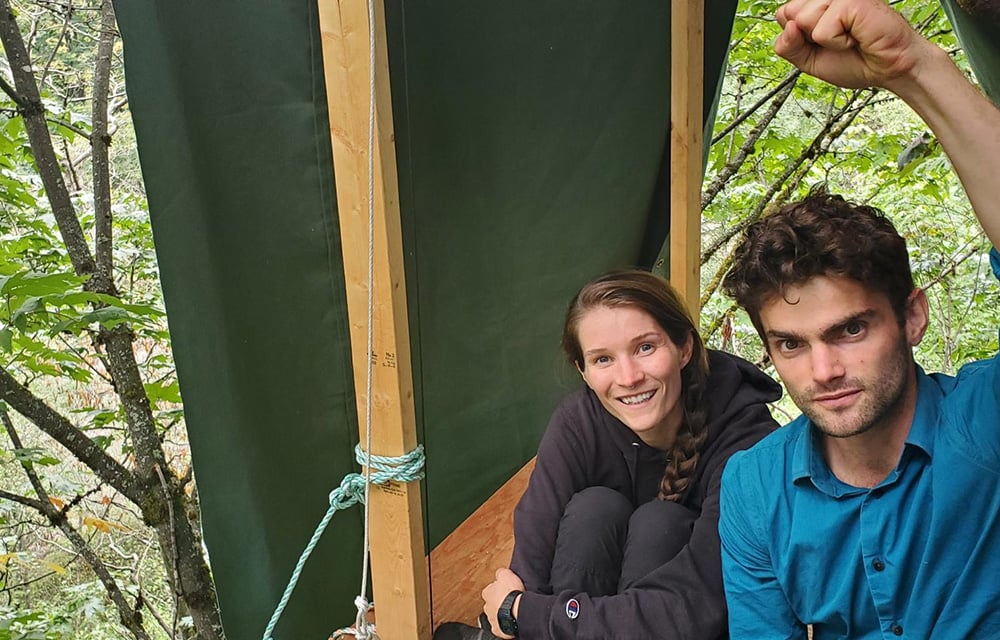Protesters in a leafy forest 10 minutes from Burnaby’s Lougheed SkyTrain station say contractors for the Trans Mountain pipeline expansion project are putting their lives in danger.
The 60-person strong environmental organization Protect the Planet Stop TMX has occupied structures built high in cottonwood and big leaf maple trees in the area for over a year. By sitting in trees, protesters stop pipeline development because Trans Mountain is unable to clear the forest, the protesters say.
It’s a strategy that’s worked up until now, says Timothee Govare, a protester who has spent more than 100 days occupying tree sits in the area.
On Tuesday, workers put a blue fence around the base of the trees the protesters are occupying. On Wednesday morning, they showed up with chainsaws and started cutting down trees within 15 metres of the tree sits, Govare said.
Some of the trees they’re cutting down are 20 metres tall, he said, putting the protesters at risk.
When The Tyee spoke with Govare over phone, he had to yell to be heard over the roaring chainsaws. Govare is currently on a platform 22 metres off the ground in a large cottonwood tree, which has been occupied by a rotating crew of 15 protesters for the past 267 days, he said.
Govare said he was scared, but not willing to leave the tree.
“I don’t think they’re going to try to kill us, just scare us. It’s always what the power does, they intimidate,” he says. “We’re not going to back down when bullied, we have to stand up for what matters.”
And what matters is protecting the climate. Govare says he is terrified of the climate crisis.
“That’s why we’re up here; that’s why we’re willing to take a lot of risk. If we don’t risk it right now, we risk everything later on,” he said. “Look around at the smoke, the village of Lytton burned to the ground — how many more towns need to burn before we start doing something?”
Allowing the Trans Mountain pipeline to be built will lock Canada into decades of fossil fuel expansion, Govare says. “That’s the complete reverse of what we should be doing.”
The Trans Mountain pipeline expansion project is twinning the current pipeline that runs from near Edmonton to Burnaby and will increase the capacity to 890,000 barrels of oil per day from 300,000, according to Trans Mountain. The federal government bought the pipeline for $4.5 billion in early 2018.
Costs have since ballooned to over $12.6 billion as of this spring, which is the last time Trans Mountain updated the project’s cost.
This spring the International Energy Agency said the world has to stop all new fossil fuel projects by the end of the year and reduce the demand for coal, oil and gas to hit net-zero emissions by 2050.
In the summer, the UN Intergovernmental Panel on Climate Change said fossil fuels are to blame for global warming and the world needs to divest as soon as possible to avoid catastrophic weather events. Otherwise, extreme weather, like fatal heat waves in B.C. and flash floods in New York will become the new normal.
On Wednesday, West Coast Environmental Law released a report that found the pipeline’s expansion is likely delayed until 2023, when it was due to be completed December 2022. The delays will add millions to the overall cost of the pipeline, it said.
But how much is not known — the report also calls on the incoming federal government to be more transparent about funding for the publicly owned pipeline, and to include the “climate costs of the increased fossil fuel consumption facilitated by this project.”
Canada and B.C. politicians don’t seem to understand the urgency of the climate crisis, Govare said.
Chainsaws under the treefort now. @WorkSafeBC and @CityofBurnaby telling us to call @MPJulian @theJagmeetSingh @terrybeech.
— PPSTMX (@PPSTMX1) September 9, 2021
Rally today from 1-4 to help #StopTMX. pic.twitter.com/pYYllPtDjt
“You’re putting a new pipeline in the ground, don’t tell me you’re a climate leader,” he says. “If we want our leaders to be bold we have to show them how, we need to step in and take this on.”
And that means putting your body on the line, or in a tree, to block a pipeline — which can be dangerous.
Govare says he called 911 and WorkSafeBC after workers started to cut down nearby trees, but was told his safety was not their responsibility.
The tree sit is on BNSF Railway land, a company that runs one of the largest rail networks in North America and has its own police. The RCMP told The Tyee the protest is on private land and under the jurisdiction of BNSF police.
BNSF told The Tyee Trans Mountain is responsible for the worksite.
S. Sgt. Janelle Shoihet, senior media relations officer with the BC RCMP, said the safety of workers, protesters and even a random passer-by are the responsibility of the company cutting the trees.
But protesters are also partially responsible for their own safety and should leave any situation they feel is unsafe, she added.
WorkSafeBC said it only covered worker safety, and protester safety was outside its jurisdiction.
Trans Mountain does have an injunction making it illegal to block pipeline development, but Burnaby RCMP media spokesperson Cpl. Mike Kalanj said that unless protesters “are impeding work, even if they’re inside the injunction line, they’re not getting arrested.”
Govare said communication between the protesters and Trans Mountain is broken and that employees don’t speak to the protesters or return their phone calls.
Trans Mountain and Clearwater Tree Service, the company Govare says is contracted to fell the trees, did not respond to repeat media requests by publication time.
Govare said around 40 protesters came out to support the tree sitters on Wednesday, and one woman was arrested for refusing to move out of the way of heavy machinery.
He thinks trees are being cleared so workers can bring in a cherry picker and clear out the protesters but estimates that won’t be able to happen before Friday.
“The climate is changing, we’re not living in the same world as we were in 2018,” Govare said, adding the three-year-old injunction needs to be re-evaluated. ![]()
Read more: Energy, Rights + Justice, Environment
















Tyee Commenting Guidelines
Comments that violate guidelines risk being deleted, and violations may result in a temporary or permanent user ban. Maintain the spirit of good conversation to stay in the discussion.
*Please note The Tyee is not a forum for spreading misinformation about COVID-19, denying its existence or minimizing its risk to public health.
Do:
Do not: